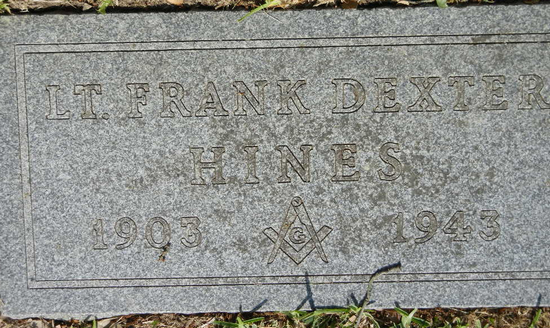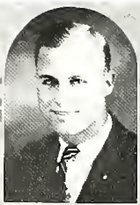Frank Hines
| Date and Place of Birth: | July 18, 1903 Harwood, TX |
| Date and Place of Death: | September 4, 1943 nr. Afton, Virginia |
| Baseball Experience: | Minor League |
| Position: | Outfield |
| Rank: | Second Lieutenant |
| Military Unit: | 58th Flying Training Detachment USAAF |
| Area Served: | United States |
Frank Hines was lucky to have a sensational 1924 rookie season in minor league baseball after getting caught in a bootleg shootout the year before. Military service came calling 14 years after the end of his playing days.
Frank Dexter Hines was born in Harwood, Texas on
July 18, 1903. One of seven children born to Francis and Mary Hines,
Frank was a star athlete at Heights High School in Houston.
In 1922, Hines attended Rice University and played at least freshman
baseball before leaving education. In 1923, he was playing amateur
baseball in Houston with the Herbert L. Flake team and Dow Motor
Company, with his life almost coming to an end that year when he was
shot. On September 13, 1922, at the Sims bayou bridge, three miles from
Harrisburg, Frank Hines was working with his brother, Keller, as
prohibition officers and had just seized a large quantity of whiskey
from two bootleggers, whom they placed under arrest. At around this
time, two Harrisburg deputy constables drove by and stopped their
vehicle just beyond the location of the prohibition officers. Assuming
they were bootleggers, the constables drew their weapons and opened fire
on the Hines brothers. Frank was hit in the hand, while his brother, who
sustained a slight wound to his foot, thought the constables were with
the bootleggers they had just arrested, seized a Winchester rifle and
returned fire, shooting both constables. An investigation followed with
no charges being made against anyone and the incident was declared a
case of mistaken identity.
In 1924, Frank Hines signed with the Enid Harvesters of the Class D
Southwestern League and enjoyed a sensational rookie season, batting
.315 in 91 games and a league-leading 24 stolen bases. He returned to
his hometown of Houston in August and played at least one game for the
Class A Texas League Houston Buffs. Despite a promising start to his
professional career, Hines was in and out of baseball over the coming
seasons, possibly as a result of wanting secure employment after getting
married to Minnie Neel in January 1925. He worked as a statistician for
a sulphur company, but played 21 games with the Springfield Senators of
the Class B Three-I League in 1927 (batting .313) and 38 games with the
Fort Wayne Chiefs of the Class B Central League in 1928. By 1940, he was
a gas and oil lease broker living a comfortable life in a house worth
today's equivelant of $350,000 at 3202 Parkwood Drive in Houston, with
his wife, Minnie, sister-in-law Mattie and niece Louise.
Hines entered military service in September 1942, at the age of 39. He
served as a second lieutenant with the Army Air Force, attached to the
58th Flying Training Detachment at Hawthorne School of Aeronautics in
Orangeburg, South Carolina. On September 4, 1943, 40-year-old Frank
Hines was the passenger in a twin-seat Vultee BT-13A Valiant basic
trainer that took off from Orangeburg and later crashed near Afton,
Virginia, in the Blue Ridge Mountains. Hines was killed in the crash,
while pilot, Edward M. Kass, escaped with injuries and was taken to
Woodrow Wilson General Hospital near Staunton.
Frank Hines' body was returned to Texas and he is buried at Forest Park
Cemetery in Houston.
Date Added May 1, 2022
Thanks to Davis O. Barker for "discovering" Frank Hines.
Baseball's Greatest Sacrifice is associated with Baseball Almanac
Baseball's Greatest Sacrifice is proud to be sponsored by


